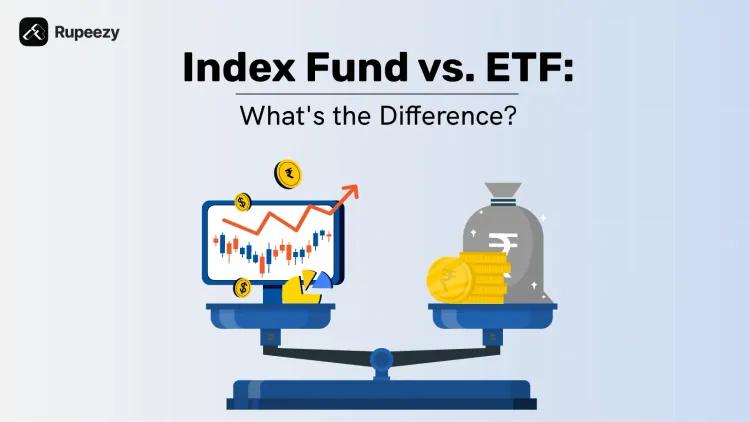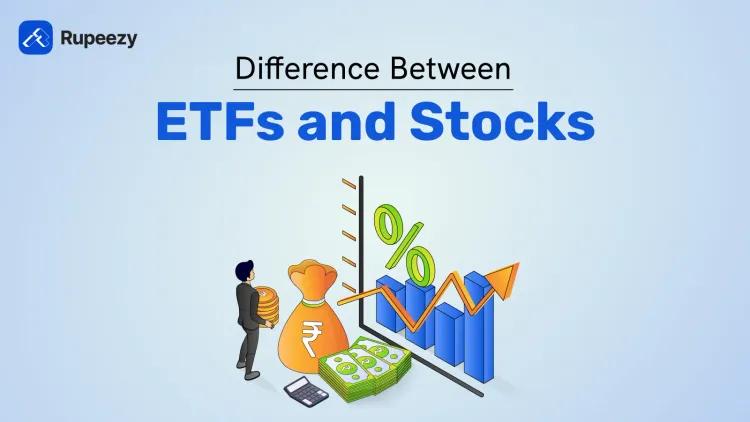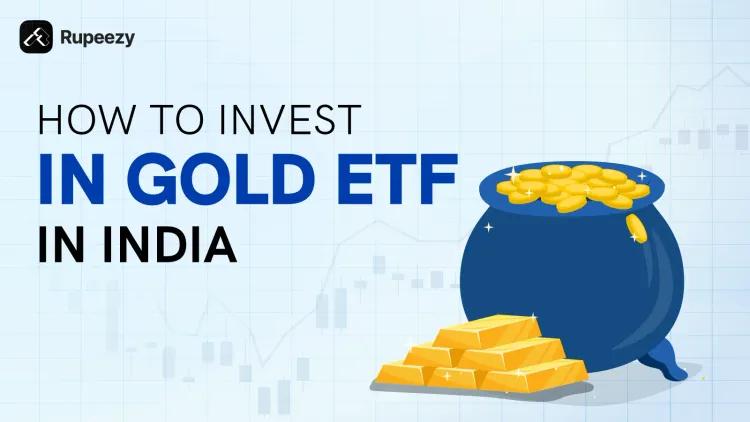What Is a Currency ETF in India and Can You Trade It


00:00 / 00:00
When you look for various ways to invest, you can see many investment options. One of them is Exchange Traded Funds (ETFs). These ETFs invest across multiple asset classes, and they can follow either passive or active schemes. Some ETFs focus on specific segments, and one such category is Currency ETFs.
These Currency ETFs can help you hedge risks or profit from currency fluctuations. In this article, we’ll explore how these ETFs work, their benefits, risks, and how to invest in Currency ETFs in India. So let’s dive in!
What is Currency ETF?
Currency ETF is a type of ETF in which domestic currency is traded against a single currency or a basket of currencies while providing exposure to foreign currencies or exchange rate fluctuations to investors and traders. It is often backed by bank deposits holding a foreign currency.
How Currency Exchange Traded Funds Work
A currency ETF can serve both as an investment and a hedging tool. It can allow investors to gain exposure to either a single foreign currency (like USD) or a basket of currencies, which is traded against the domestic currency (like the Indian rupee) in the form of an ETF. These ETFs help protect against currency fluctuations and can be useful for anyone with foreign investments, overseas education or travel plans, or import-related purchases in foreign currencies.
How Currency ETFs Help You Invest or Hedge Currency Exposure
To understand, we will look at an example. Let’s say if you're planning a trip to the USA in the upcoming months and you're worried that the US dollar might appreciate, you could buy a USDINR ETF (example). If the dollar strengthens, your ETF investment would gain, which can effectively offset the increased travel costs, especially from an Indian rupee perspective. It is also called hedging.
On the other hand, if you believe that the US dollar will weaken, you might choose an ETF that benefits you when the INR gains value or the USD depreciates. This allows you to profit from currency movements, much like how stock investors anticipate price movements.
From an investment perspective, currency ETFs can help you make gains on expected currency appreciation or depreciation driven by global events. For instance, if the US Federal Reserve cuts interest rates, the US dollar typically weakens, and a USDINR ETF may decline in value. But if the Fed raises rates, the dollar may strengthen, and the ETF could gain.
Some active traders also use Margin Trading Facility when they expect global events like Fed announcements or geopolitical shifts to influence stock prices. With MTF, you can buy select stocks by paying only part of the trade value while the broker funds the rest. Although it doesn’t apply to currency ETFs, it is another way investors take leveraged positions during volatile periods, making disciplined risk management essential.
Factors to Consider Before Investing in a Currency ETF in India
Having understood how currency ETFs can benefit you, here are some important factors to consider before you invest.
Purpose of the Investment: Decide whether you want to hedge currency or earn profit from currency movements. Currency ETFs can protect importers or exporters or help investors gain from forex trends.
Study the Historical Performance: Review past returns of the currency ETF over different timeframes. While past performance does not guarantee future returns, it can provide a sense of how the ETF reacts to global events, interest rate shifts, and economic indicators.
Understand the Costs Involved: Currency ETFs come with expense ratios and brokerage charges. Though lower than mutual funds, as it is passively managed, these costs can affect overall returns. Also, you can check for currency conversion or tax charges if applicable at the time of buying or redemption.
Analyse Macroeconomic Factors: Currency values depend on interest rates, inflation, balance of trade, and geopolitical events. For example, strong U.S. economic growth may boost USD ETFs and devalue other currencies. Always stay informed about such macro trends to make better investment decisions.
Check for Currency Volatility: Some currencies, like the Japanese Yen, are more stable, while other emerging market or developing country currencies can be highly volatile. Always understand the risk level of the currency you’re investing in, as large swings can impact your portfolio negatively or positively.
Benefits of Investing in Currency ETFs
Here we discuss the benefits of investing in Currency ETFs in India:
Protects Against Currency Fluctuations: You can use currency ETFs to protect your money when the exchange rate fluctuates. The benefit is to hedge or make gains to decrease risk and increase wealth.
Easy to Invest in Foreign Currencies: You don’t need to open a forex trading account or deal with any complex tools. Currency ETFs help you to invest in foreign currencies just like buying a stock or mutual fund.
Portfolio Diversification: Most people would invest in stocks, gold, real estate, or other asset classes. Adding Currency ETFs is a different type of diversification. It can reduce your overall risk because currency prices don’t always move in the same way as stocks.
Advantage of Global Events: If you think a significant event is going to occur, let’s say, like a war, an increase in inflation, or a US Fed interest rate hike, you can use a currency ETF and try to benefit from it. Some currencies rise or fall after such events, so you can take a chance and make gains.
Low Cost and Fractional exposure: You don’t need to buy thousands of dollars or euros. You can just invest a small amount in a currency ETF and still get exposure to that currency. It is a better way to hedge a currency without actually buying the currency itself.
Trades like a stock: You can buy or sell currency ETFs anytime, especially during market hours, just like any share. You can watch the price movements live and exit when you want. It’s way more flexible than traditional foreign exchange methods.
Gains in Short-Term: The gains from the currency ETFs are better in the short to medium-term period. Like if you think the dollar will rise in the next few months, you can buy a USD ETF. The short-term view can lead to gains based on your market view.
Risks Related to Currency ETFs
With every advantage comes a downside. Here are some of the risks of investing in Currency ETFs in India:
Some are Illiquid: Some currency ETFs may have low liquidity and volumes. These products are relatively new, especially in India, and it can be hard to attract investors or traders.
High Expense Ratios: Even though they track currencies passively, some ETFs can charge high fees. It can reduce your overall returns, especially when the currency doesn’t move much or moves slowly over time.
Tracking Errors: Currency ETFs may not follow the exact exchange rate or futures price movements. This gap can occur due to various factors, like timing delays or replication errors of the currency index.
Geopolitical Risks: Currencies react sharply to wars, elections, or global tensions. A sudden global event can cause big swings, and your ETF may lose value if you don't account for the risk factor.
No Regular Income: Unlike stocks or bonds, currency ETFs do not deliver you interest or dividends. You can make gains only if the currency moves the way you expect.
Not Meant for Long-Term Holding: Currency ETFs don’t grow much in the long run. They don’t generate wealth like equity funds. People mostly use them for short-term trades or to protect against currency value loss.
How to Invest in Currency ETF in India
Currently, there are no noticeable Currency ETFs in India on the NSE and BSE. SEBI allows currency derivatives, but no currency ETF in India has directly tracked forex pairs like USD/INR yet. However, investors can gain indirect exposure through international ETFs or mutual fund FoFs (Fund of Funds) like Mirae Asset NYSE FANG+ and Motilal Oswal Nasdaq 100, through which the investors can benefit if the USD strengthens against INR.
To access actual currency ETFs like UUP, Invesco DB U.S. Dollar Bullish Fund, or USDU, WisdomTree Bloomberg U.S. Dollar Bullish Fund, Indian investors must use the Liberalised Remittance Scheme (LRS) route. These ETFs trade globally and track major currencies. SEBI may allow domestic currency ETFs in the future as interest in global investing grows.
Who Should Invest in Currency ETFs?
Investors should have a high risk-taking ability to invest or trade in Currency ETFs . The choice to invest depends on whether they aim to profit from currency movements, hedge against foreign currency appreciation, or protect their funds against geopolitical uncertainties.
Conclusion
As we conclude, we now know how Currency ETFs work, factors for investors, benefits and risks, and others. These currency ETFs are ideal for investors who understand global trends and can handle higher risk. If you want to protect your money or earn gains from currency movements, these ETFs can help. Remember to always invest with clear objectives and awareness of the risks involved, or consult financial advisors and understand risks before investing.
FAQs
Q1. Do currency ETFs pay dividends?
No, currency ETFs do not pay dividends. They don’t invest in companies, so there’s no profit to share. The gains are earned only when the currency value moves.
Q2: List of currency ETFs in India?
Currently, there are no currency ETF in India. However, there are 5 noticeable currency ETFs across the world. If you are interested in international exposure, you can look for Mirae Asset NYSE FANG+ and Motilal Oswal Nasdaq 100 as an indirect way of gains through currency fluctuations.
Q3. How Currency ETFs Help Hedge Against Rupee Fluctuations?
If the rupee weakens and you have to spend in dollars, your costs go up. For example, if you buy the USDINR ETF, it can help you reduce the loss. When the rupee falls, the USD rises, so this ETF can increase.
Q4. How to Track the Performance of a Currency ETF?
You can check the price of a currency ETF through stock exchange websites. You can see how much it has risen or declined and compare it with the currency it follows, like USDINR, over time, like 1 month or 1 year.
Q5. Currency ETFs vs Forex Trading: What’s Better for You?
Currency ETFs are easy and safer. You buy and hold like a stock. Forex trading is riskier. If you are interested in having a simple exposure to currency fluctuations, ETFs are better.
Q6. Currency ETFs vs Gold and Equity ETFs: What’s Better?
It depends on your needs. You can use currency ETFs to protect against foreign exchange changes. Gold ETFs are better when markets panic. Equity ETFs are better if you want to grow your wealth in the long run by investing in companies.
Check Out These Related Articles |
The content on this blog is for educational purposes only and should not be considered investment advice. While we strive for accuracy, some information may contain errors or delays in updates.
Mentions of stocks or investment products are solely for informational purposes and do not constitute recommendations. Investors should conduct their own research before making any decisions.
Investing in financial markets are subject to market risks, and past performance does not guarantee future results. It is advisable to consult a qualified financial professional, review official documents, and verify information independently before making investment decisions.

All Category










